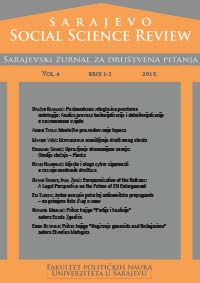Postmoderna vrtoglavica prostorne ontologije: analiza procesa teritorijalizacije i deteritorijalizacije u suvremenom svijetu
Postmodern Dizziness of Spatial Ontology: the Analysis of Processes of Territorialisation and Deterritorialisation in the Contemporary World
Author(s): Dražen BarbarićSubject(s): Nationalism Studies, Sociology of Politics, Geopolitics
Published by: Fakultet političkih nauka - Univerzitet u Sarajevu
Keywords: postmodern geopolitical context; deterritorialisation versus reterritorialisation; the problem of the Other; geopolitical black holes; epistemological imperialism;
Summary/Abstract: The purpose of this paper is to critically approach the concept of deterritorialisation and its continuum pair of territorialisation, and therefore try to point out to their indistinguishable dialectical nature. The aim is to show that every process of deterritorialisation results in reterritorialisation in terms of spatial ballast or waste, in a concrete fashion. A significant part of the paper is dedicated to proving that many authors have written off the space as an important variable of socio-political processes much too early. The first point is to acknowledge that postmodern critical geopolitics methodologically neglects the territorial basis of spatial discourse and practice through their deconstruction and therefore loses an important analytical segment. The second point is the emphasis on the fact that the identity construction of selfhood always demands spatial differentiation from the Other, which is an exceptional proof of the importance of space in postmodern conditions. The paper can also be interpreted as an unpretentious methodological attempt to emphasize the already mentioned indistinguishability of the processes of deterritorialisation and reterritorialisation with an important review, which leads to the acceptance of the much larger responsibility of agents towards spatial imagination and practice, as well as to appreciation of the broadest spectrum of different spatial perspectives and discourses.
Journal: Sarajevski žurnal za društvena pitanja
- Issue Year: IV/2015
- Issue No: 1-2
- Page Range: 7-26
- Page Count: 20
- Language: Croatian

